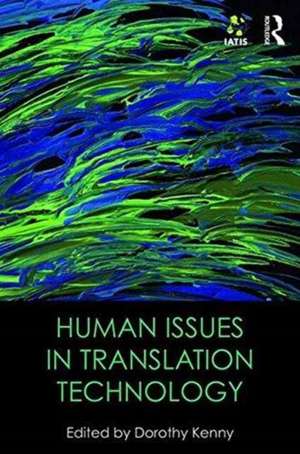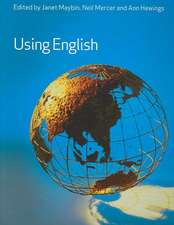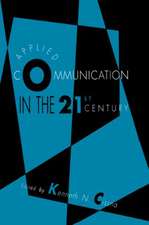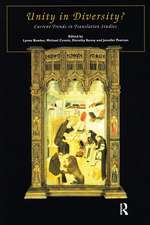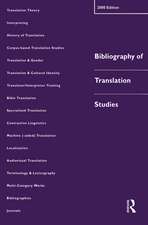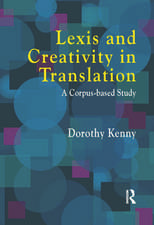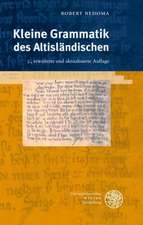Human Issues in Translation Technology: The IATIS Yearbook
Editat de Dorothy Kennyen Limba Engleză Hardback – 12 ian 2017
Covering technologies from machine translation to online collaborative platforms, and practices from ‘traditional’ translation to crowdsourced translation and subtitling, this volume takes a critical stance, questioning both utopian and dystopian visions of translation technology. In eight chapters, the authors propose ideas on how technologies can better serve translators and end users of translations. The first four chapters explore how translators – in various contexts and with widely differing profiles – use and feel about translation technologies as they currently stand, while the second four chapters focus on the future: on anticipating needs, identifying emerging possibilities, and defining interventions that can help to shape translation practice and research.
Drawing on a range of theories from cognitive to social and psychological, and with empirical evidence of what the technologization of the workplace means to translators, Human Issues in Translation Technology is key reading for all those involved in translation and technology, translation theory and translation research methods.
| Toate formatele și edițiile | Preț | Express |
|---|---|---|
| Paperback (1) | 382.36 lei 6-8 săpt. | |
| Taylor & Francis – 18 dec 2020 | 382.36 lei 6-8 săpt. | |
| Hardback (1) | 999.12 lei 6-8 săpt. | |
| Taylor & Francis – 12 ian 2017 | 999.12 lei 6-8 săpt. |
Preț: 999.12 lei
Preț vechi: 1218.44 lei
-18% Nou
Puncte Express: 1499
Preț estimativ în valută:
191.19€ • 200.53$ • 159.16£
191.19€ • 200.53$ • 159.16£
Carte tipărită la comandă
Livrare economică 01-15 aprilie
Preluare comenzi: 021 569.72.76
Specificații
ISBN-13: 9781138123298
ISBN-10: 1138123293
Pagini: 196
Ilustrații: 62
Dimensiuni: 156 x 234 x 18 mm
Greutate: 0.42 kg
Ediția:1
Editura: Taylor & Francis
Colecția Routledge
Seria The IATIS Yearbook
Locul publicării:Oxford, United Kingdom
ISBN-10: 1138123293
Pagini: 196
Ilustrații: 62
Dimensiuni: 156 x 234 x 18 mm
Greutate: 0.42 kg
Ediția:1
Editura: Taylor & Francis
Colecția Routledge
Seria The IATIS Yearbook
Locul publicării:Oxford, United Kingdom
Public țintă
Postgraduate and UndergraduateCuprins
Introduction
Dorothy Kenny
1 Love letters or hate mail? Translators' technology acceptance in the light of their emotional narratives
Kaisa Koskinen and Minna Ruokonen
2 Deconstructing translation crowdsourcing with the case of a Facebook initiative: A translation network of engineered autonomy and trust?
Minako O'Hagan
3 'I can't get no satisfaction!' Should we blame translation technologies or shifting business practices?
Matthieu LeBlanc
4 How do translators use web resources? Evidence from the performance of Chinese-English translators
Vincent X. Wang and Lily Lim
5 Translators' needs and preferences in the design of specialized termino-lexicographic tools
Alejandro García-Aragón and Clara Inés López-Rodríguez
6 Assessing user interface needs of post-editors of machine translation
Joss Moorkens and Sharon O'Brien
7 Issues in human and automatic translation quality assessment
Stephen Doherty
8 Can U read ths? The reception of txt language in subtitling
Alina Secară
Dorothy Kenny
1 Love letters or hate mail? Translators' technology acceptance in the light of their emotional narratives
Kaisa Koskinen and Minna Ruokonen
2 Deconstructing translation crowdsourcing with the case of a Facebook initiative: A translation network of engineered autonomy and trust?
Minako O'Hagan
3 'I can't get no satisfaction!' Should we blame translation technologies or shifting business practices?
Matthieu LeBlanc
4 How do translators use web resources? Evidence from the performance of Chinese-English translators
Vincent X. Wang and Lily Lim
5 Translators' needs and preferences in the design of specialized termino-lexicographic tools
Alejandro García-Aragón and Clara Inés López-Rodríguez
6 Assessing user interface needs of post-editors of machine translation
Joss Moorkens and Sharon O'Brien
7 Issues in human and automatic translation quality assessment
Stephen Doherty
8 Can U read ths? The reception of txt language in subtitling
Alina Secară
Notă biografică
Dorothy Kenny is Associate Professor in the School of Applied Language and Intercultural Studies at Dublin City University. She is the author of Lexis and Creativity in Translation (Routledge, 2001), and served on the Executive Council of the International Association for Translation and Intercultural Studies from 2004 to 2016.
Recenzii
"Human Issues in Translation Technology remains one of the few books exploring technological impact on translation professionals and possible future consequences of emerging technologies."
- Daniel Segura Giménez, Autonomous University of Barcelona - The Journal of Specialised Translation
- Daniel Segura Giménez, Autonomous University of Barcelona - The Journal of Specialised Translation
Descriere
This state-of-the-art volume looks at translation technologies from the point of view of the humans users – as trainee, professional or volunteer translators, or as end users of translations produced by machines. Covering technologies from machine translation to online collaborative platforms and practices from ‘traditional’ translation to crowdsourced translation and subtitling, this volume takes a critical stance, questioning both utopian and dystopian visions of translation technology. The authors provide empirical evidence of what the technologization of the workplace means to translators, and propose ideas on how technologies can better serve translators and end-users of translations.
